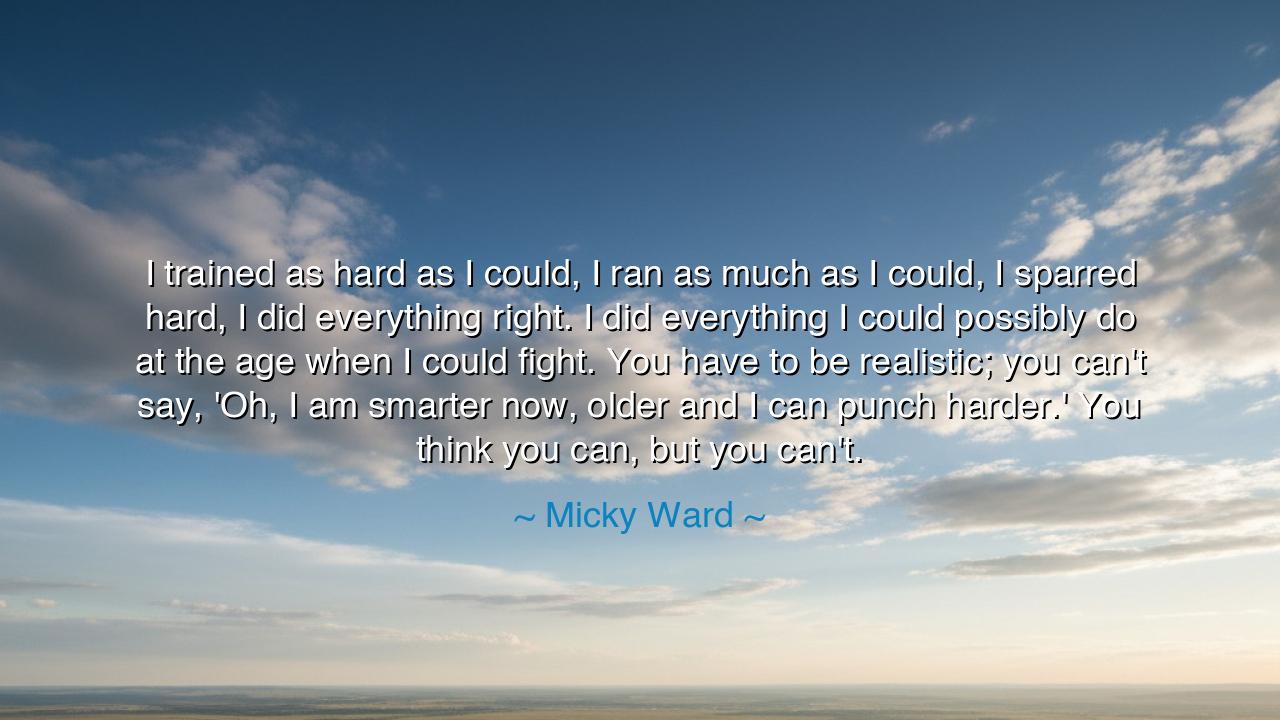
I trained as hard as I could, I ran as much as I could, I sparred
I trained as hard as I could, I ran as much as I could, I sparred hard, I did everything right. I did everything I could possibly do at the age when I could fight. You have to be realistic; you can't say, 'Oh, I am smarter now, older and I can punch harder.' You think you can, but you can't.






"I trained as hard as I could, I ran as much as I could, I sparred hard, I did everything right. I did everything I could possibly do at the age when I could fight. You have to be realistic; you can't say, 'Oh, I am smarter now, older and I can punch harder.' You think you can, but you can't." — thus spoke Micky Ward, the warrior of Lowell, Massachusetts, whose fists and spirit became legend in the world of boxing. His words are the confession of a man who has walked through the fire of youth and emerged tempered, not boastful. They are the words of one who has tasted both glory and decline and has learned that time, like a silent referee, governs even the strongest of men.
In the style of the ancients, one might say: the river of life flows only forward, and no swimmer, no matter how mighty, can fight its current forever. Ward’s wisdom is not a lamentation, but an act of humility — the realization that effort must be bound by reality. He speaks of the discipline of his youth — the long miles run before dawn, the sweat poured in gyms heavy with the scent of leather and blood, the relentless will that made him rise after every fall. In his prime, he gave all that he could give, holding nothing back. But now, older, he understands that there comes a time when the body no longer obeys the same command as the will. His honesty is not weakness; it is the highest form of strength — the courage to face truth without illusion.
Micky Ward’s quote echoes a timeless truth about the nature of human limits. In youth, the body is flame — fierce, tireless, and defiant. In age, that flame becomes a steady glow, warm but no longer consuming. Many men cling to the dream that they can outwit the years, that wisdom alone can replace vitality. But Ward, with the clarity of a fighter who has bled and healed, tells us otherwise. There is a season for battle and a season for reflection. To ignore this rhythm is to suffer pride’s cruel punishment — the illusion of endless strength.
We may see the same lesson in the story of Achilles, the Greek hero who knew his destiny yet charged into the fight, blazing like the sun. His glory was unmatched, but his flame was short-lived. Compare him with Odysseus, who, older and tempered, fought his wars not with strength but with cunning. The two heroes represent the eternal balance — the passion of youth and the prudence of age. What Ward reminds us is that wisdom cannot make the old body young again; it can only make the aging soul peaceful in its understanding. The true victory, then, lies not in fighting time, but in accepting it with grace.
His words also speak to the discipline of realism — a quality rarer than courage itself. For while courage drives men into battle, realism teaches them when to lay down their arms. To admit that one cannot punch harder, run faster, or endure longer is not defeat; it is wisdom. In that acceptance lies dignity. Ward’s humility elevates him above the false bravado that consumes many athletes — those who chase one last fight, one last title, long after the fire has gone. He shows us that honor is not found in endless struggle, but in knowing when to step aside, content in having given everything when the moment was right.
The lesson is clear: give your all in your appointed season. When the time for striving comes, do not hold back; let no effort go unspent. But when that season passes, do not curse the years that have shaped you. Instead, honor them. Let your strength become teaching, your fire become light. The man who trains his heart as he once trained his hands will find that his spirit grows stronger even as his muscles fade. Such is the path from warrior to sage.
And so, my child, remember Micky Ward’s wisdom: fight fiercely when it is your time to fight, but when the hour of stillness comes, greet it without bitterness. Know that no man remains forever at his peak — yet no man who gives his all in youth ever truly declines. His victories live on, not in his body, but in his character. For though age may dull the punch, it sharpens the soul — and in that balance lies the truest kind of strength, the kind that endures beyond the ring, beyond the years, beyond even the fight itself.






AAdministratorAdministrator
Welcome, honored guests. Please leave a comment, we will respond soon